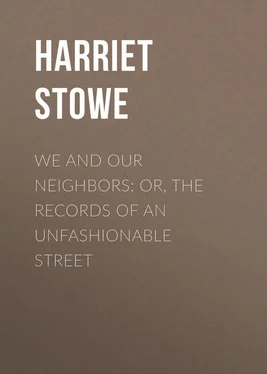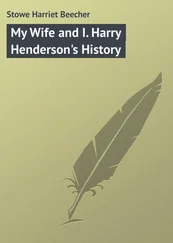Harriet Stowe - We and Our Neighbors - or, The Records of an Unfashionable Street
Здесь есть возможность читать онлайн «Harriet Stowe - We and Our Neighbors - or, The Records of an Unfashionable Street» — ознакомительный отрывок электронной книги совершенно бесплатно, а после прочтения отрывка купить полную версию. В некоторых случаях можно слушать аудио, скачать через торрент в формате fb2 и присутствует краткое содержание. ISBN: , Жанр: foreign_prose, на английском языке. Описание произведения, (предисловие) а так же отзывы посетителей доступны на портале библиотеки ЛибКат.
- Название:We and Our Neighbors: or, The Records of an Unfashionable Street
- Автор:
- Жанр:
- Год:неизвестен
- ISBN:http://www.gutenberg.org/ebooks/48603
- Рейтинг книги:4 / 5. Голосов: 1
-
Избранное:Добавить в избранное
- Отзывы:
-
Ваша оценка:
- 80
- 1
- 2
- 3
- 4
- 5
We and Our Neighbors: or, The Records of an Unfashionable Street: краткое содержание, описание и аннотация
Предлагаем к чтению аннотацию, описание, краткое содержание или предисловие (зависит от того, что написал сам автор книги «We and Our Neighbors: or, The Records of an Unfashionable Street»). Если вы не нашли необходимую информацию о книге — напишите в комментариях, мы постараемся отыскать её.
We and Our Neighbors: or, The Records of an Unfashionable Street — читать онлайн ознакомительный отрывок
Ниже представлен текст книги, разбитый по страницам. Система сохранения места последней прочитанной страницы, позволяет с удобством читать онлайн бесплатно книгу «We and Our Neighbors: or, The Records of an Unfashionable Street», без необходимости каждый раз заново искать на чём Вы остановились. Поставьте закладку, и сможете в любой момент перейти на страницу, на которой закончили чтение.
Интервал:
Закладка:
If the minds of the ancient sisters were a museum of by-gone ideas, and literature, and tastes, the old Vanderheyden house was no less a museum of by-gone furniture. The very smell of the house was ghostly with past suggestion. Every article of household gear in it had grown old together with all the rest, standing always in the same spot, subjected to the same minute daily dusting and the same semi-annual house-cleaning.
Carlyle has a dissertation on the "talent for annihilating rubbish." This was a talent that the respectable Miss Dorcas had none of. Carlyle thinks it a fine thing to have; but we think the lack of it may come from very respectable qualities. In Miss Dorcas it came from a vivid imagination of the possible future uses to which every decayed or broken household article might be put. The pitcher without nose or handle was fine china, and might yet be exactly the thing for something, and so it went carefully on some high perch of preservation, dismembered; the half of a broken pair of snuffers certainly looked too good to throw away – possibly it might be the exact thing needed to perfect some invention. Miss Dorcas vaguely remembered legends of inventors who had laid hold on such chance adaptations at the very critical point of their contrivances, and so the half snuffers waited years for their opportunity. The upper shelves of the closets in the Vanderheyden house were a perfect crowded mustering ground for the incurables and incapables of household belongings. One might fancy them a Hotel des Invalides of things wounded and fractured in the general battle of life. There were blades of knives without handles, and handles without blades; there were ancient tea-pots that leaked – but might be mended, and doubtless would be of some good in a future day; there were cracked plates and tea-cups; there were china dish-covers without dishes to match; a coffee-mill that wouldn't grind, and shears that wouldn't cut, and snuffers that wouldn't snuff – in short, every species of decayed utility.
Miss Dorcas had in the days of her youth been blest with a brother of an active, inventive turn of mind; the secret crypts and recesses of the closets bore marks of his unfinished projections. There were all the wheels and weights and other internal confusions of a clock, which he had pulled to pieces with a view of introducing an improvement into the machinery, which never was introduced; but the wheels and weights were treasured up with pious care, waiting for somebody to put them together again. All this array of litter was fated to come down from its secret recesses, its deep, dark closets, its high shelves and perches, on two solemn days of the year devoted to house-cleaning, when Miss Dorcas, like a good general, looked them over and reviewed them, expatiated on their probable capabilities, and resisted gallantly any suggestions of Black Dinah, the cook and maid of all work, or Mrs. Betsey, that some order ought to be taken to rid the house of them.
"Dear me, Dorcas," Mrs. Betsey would say, "what is the use of keeping such a clutter and litter of things that nothing can be done with and that never can be used?"
"Betsey Ann Benthusen," would be the reply, "you always were a careless little thing. You never understood any more about housekeeping than a canary bird – not a bit." In Miss Dorcas's view, Mrs. Betsey, with her snow white curls and her caps, was still a frivolous young creature, not fit to be trusted with a serious opinion on the nicer points of household management. "Now, who knows, Betsey, but some time we may meet some poor worthy young man who may be struggling along as an inventor and may like to have these wheels and weights! I'm sure brother Dick said they were wonderfully well made."
"Well, but, Dorcas, all those cracked cups and broken pitchers; I do think they are dreadful!"
"Now, Betsey, hush up! I've heard of a kind of new cement that they are manufacturing in London, that makes old china better than new; and when they get it over here I'm going to mend these all up. You wouldn't have me throw away family china, would you?"
The word " family china" was a settler, for both Mrs. Betsey and Miss Dorcas and old Dinah were united in one fundamental article of faith: that "the Family " was a solemn, venerable and awe-inspiring reality. What, or why, or how it was, no mortal could say.
Old Jacob Vanderheyden, the grandfather, had been in his day busy among famous and influential men, and had even been to Europe as a sort of attaché to the first American diplomatic corps. He had been also a thriving merchant, and got to himself houses, and lands, and gold and silver. Jacob Vanderheyden, the father, had inherited substance and kept up the good name of the family, and increased and strengthened its connections. But his son and heir, Dick Vanderheyden, Miss Dorcas's elder brother, had seemed to have no gifts but those of dispersing; and had muddled away the family fortune in all sorts of speculations and adventures as fast as his father and grandfather had made it. The sisters had been left with an income much abridged by the imprudence of the brother and the spendthrift dissipation of Mrs. Betsey's husband; they were forsaken by the retreating waves of rank and fashion; their house, instead of being a center of good society, was encompassed by those ordinary buildings devoted to purposes of trade whose presence is deemed incompatible with genteel residence. And yet, through it all, their confidence in the rank and position of their family continued unabated. The old house, with every bit of old queer furniture in it, the old window curtains, the old tea-cups and saucers, the old bedspreads and towels, all had a sacredness such as pertained to no modern things. Like the daughter of Zion in sacred song, Miss Dorcas "took pleasure in their dust and favored the stones thereof." The old blue willow-patterned china, with mandarins standing in impossible places, and bridges and pagodas growing up, as the world was made, out of nothing, was to Miss Dorcas consecrated porcelain – even its broken fragments were impregnated with the sacred flavor of ancient gentility.
Miss Dorcas's own private and personal closets, drawers, and baskets were squirrel's-nests of all sorts of memorials of the past. There were pieces of every gown she had ever worn, of all her sister's gowns, and of the mortal habiliments of many and many a one beside who had long passed beyond the need of earthly garments. Bits of wedding robes of brides who had long been turned to dust; fragments of tarnished gold lace from old court dresses; faded, crumpled, artificial flowers, once worn on the head of beauty; gauzes and tissues, old and wrinkled, that had once set off the triumphs of the gay – all mingled in her crypts and drawers and trunks, and each had its story. Each, held in her withered hand, brought back to memory the thread of some romance warm with the color and flavor of a life long passed away.
Then there were collections, saving and medicinal; for Miss Dorcas had in great force that divine instinct of womanhood that makes her perceptive of the healing power inherent in all things. Never an orange or an apple was pared on her premises when the peeling was not carefully garnered – dried on newspaper, and neatly stored away in paper bags for sick-room uses.
There were closets smelling of elderblow, catnip, feverfew, and dried rose leaves, which grew in a bit of old garden soil back of the house; a spot sorely retrenched and cut down from the ample proportions it used to have, as little by little had been sold off, but still retaining a few growing things, in which Miss Dorcas delighted. The lilacs that once were bushes there had grown gaunt and high, and looked in at the chamber windows with an antique and grandfatherly air, quite of a piece with everything else about the old Vanderheyden house.
Читать дальшеИнтервал:
Закладка:
Похожие книги на «We and Our Neighbors: or, The Records of an Unfashionable Street»
Представляем Вашему вниманию похожие книги на «We and Our Neighbors: or, The Records of an Unfashionable Street» списком для выбора. Мы отобрали схожую по названию и смыслу литературу в надежде предоставить читателям больше вариантов отыскать новые, интересные, ещё непрочитанные произведения.
Обсуждение, отзывы о книге «We and Our Neighbors: or, The Records of an Unfashionable Street» и просто собственные мнения читателей. Оставьте ваши комментарии, напишите, что Вы думаете о произведении, его смысле или главных героях. Укажите что конкретно понравилось, а что нет, и почему Вы так считаете.












